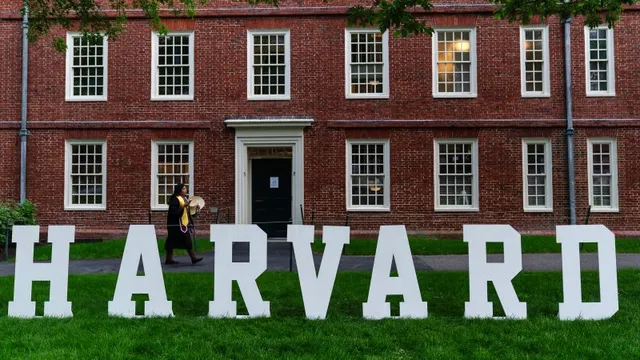
Over 12,000 Harvard alumni support university lawsuit against Trump administration
2025-06-09 13:32- Harvard University is suing the Trump administration over a halt of $2.2 billion in federal funding.
- More than 12,000 alumni signed a legal brief supporting the university, highlighting serious concerns regarding academic freedom.
- The lawsuit reflects broader issues of federal funding and its effect on universities across the United States.
Express your sentiment!
Insights
In April 2025, Harvard University initiated legal action against the Trump administration after the government halted $2.2 billion in federal funding. This decision was reportedly made following the university's failure to comply with certain demands related to an investigation of antisemitism during pro-Palestinian protests. The response from alumni was significant, with over 12,000 individuals—including notable figures from various sectors—signing an amicus brief in support of Harvard's legal challenge. They expressed deep concern over what they labeled as the government's unlawful attempts to control higher education institutions. The alumni's brief emphasized the importance of academic freedom and the potential long-term implications of the government's actions beyond Harvard itself. Alumni claimed these actions could threaten the core educational values that all colleges and universities should uphold. The brief was submitted amid a broader context where more than 60 universities were under investigation by the administration for various reasons, creating a chilling atmosphere for both students and faculty alike regarding their freedom to express and learn. As part of this ongoing fight, two Maryland universities sought to join the lawsuit, underscoring the widespread concern about funding cuts that threaten research and operational stability across various institutions. These universities, Johns Hopkins University and the University of Maryland, cited the significant disruptions that federal funding cuts would cause to their ongoing research projects, as experienced funding terminations were already affecting their operations negatively. The ramifications of these cuts were not just theoretical; they have led to layoffs and budget adjustments that could impact countless students and faculty members. With the future of federal funding for education hanging in the balance, multiple legal challenges are expected to arise from other institutions that share similar concerns over autonomy and freedom. Harvard's legal battle, therefore, has become a test case for academic institutions nationwide as they navigate the complexities of federal oversight, funding, and the preservation of educational values amidst political pressures. Oral arguments in this ongoing legal case are scheduled for July 21, 2025, raising questions about the outcome and its implications for the academic community at large.
Contexts
The history of academic freedom in the United States is marked by both advancement and challenge, reflecting the broader societal dynamics affecting education and intellectual inquiry. Academic freedom emerged in the early 20th century as a response to increasing government and institutional control over educational content and research. The first significant articulation of academic freedom came in the 1915 Declaration of Principles on Academic Freedom and Academic Tenure by the American Association of University Professors (AAUP), which emphasized the importance of the free exchange of ideas and the autonomy of educators to pursue knowledge without external interference. This foundational statement laid the groundwork for future discussions about the rights of faculty and students alike in maintaining a robust academic environment free from censorship and retaliation. The development of education as a critical public sphere and its relationship to democratic ideals significantly influenced these early notions of academic freedom. Throughout the mid-20th century, academic freedom faced numerous tests, especially during periods of war and social upheaval. The Cold War era was particularly significant, as many universities became battlegrounds for ideological conflicts. Scholars and students engaged in activism related to civil rights, anti-war movements, and other social issues, often clashing with institutional policies and government interests. This tension prompted further inquiries into the balance between individual expression and institutional governance, which resulted in landmark court cases that solidified protections for academic freedom. Notably, the U.S. Supreme Court's decisions in cases such as the 1967 case of Keyishian v. Board of Regents underscored the necessity of protecting educators against punitive measures for their political beliefs or teaching methods, establishing precedents that would guide debates on academic freedom for decades. Despite these legal developments, the landscape of academic freedom continued to evolve in response to changing cultural and political climates. The late 20th and early 21st centuries witnessed new challenges, including debates over diversity, inclusion, and the increasing commercialization of higher education. Issues of safe spaces and trigger warnings emerged as contentious topics, presenting apparent conflicts between protecting individuals from harm and maintaining open discourse. Advocates and critics of these measures have raised questions about who gets to define acceptable speech and the limits of inquiry. The question of academic freedom remains tied not only to faculty members but also uniquely involves student rights, as the student body increasingly seeks an active voice in shaping educational experiences and institutional governance. As of 2025, the discourse surrounding academic freedom continues to be a relevant and critical issue in U.S. higher education. The rise of digital platforms has transformed how knowledge is disseminated and challenged traditional academic terrains, creating tensions between established academic norms and emerging phenomena like social media. The ongoing pandemic has reoriented discussions about education access and freedom of speech, while pressing issues such as political polarization, hate speech, and institutional accountability further complicate the landscape. In this rapidly-sifting environment, the commitment to uphold principles of academic freedom—ensuring that ideas can be expressed and challenged without fear of repercussion—remains vital for cultivating a space where scholarly inquiry can thrive and contribute positively to society.